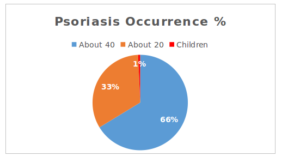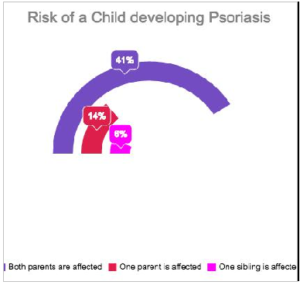Psoriasis
World Health Organization (WHO) member states adopted a resolution on psoriasis at the 67th World Health Assembly by recognizing it as “A chronic, non-communicable, painful, disfiguring, and disabling disease for which there is no cure.”
What is Psoriasis?
Psoriasis is an autoimmune non-communicable or noncontagious disease that manifests as a chronic inflammatory skin disease. It is characterized by sharply demarcated, scaly, red, coin-sized skin lesions most often on the elbows, knees, scalp, hands and feet.
What are its symptoms?
If you develop a rash that persists and does not go away with any over-the-counter medication, then it will be wise to consult our doctors. The symptoms include itching, irritation, stinging and pain. It is very rare that the entire skin surface of the body may be involved. This rare and extensive form of psoriasis can be fatal, as the extreme inflammation and peeling of the skin can disrupt the body’s ability to regulate temperature and damage the skin’s barrier functions. Skin is our first barrier of defense and in the case of Psoriasis this first line of defense is affected.
What are the types of psoriasis?
There are five types of psoriasis but many can have multiple type of psoriasis on their body at the same time.
- Plaque Psoriasis:
- This is most common among the five.
- The skin appears as raised red patches covered with a silvery white buildup of dead skin cells.
- These often occur on the scalp, knees, elbows and lower back.
- They are mostly itchy and painful.
- They can crack and bleed.
- Guttate:
- This is the second most common type. Around 10 % of patients who get psoriasis develop guttate psoriasis.
- This appears as small, dot-like lesions.
- It often starts during childhood or young adulthood
- This can be triggered by a strep infection.
- Inverse:
- This occurs as red lesions in body folds like, under the arm or like behind the knee or in the groin.
- It may appear smooth and shiny.
- Pustular:
- These are white pustules which are noninfectious and noncontagious pus blisters that are surrounded by red skin.
- The pus consists of white blood cells.
- This can show up at any part of the body, but it usually found on the hands or feet.
- Erythrodermic:
- This is severe and can be fatal.
- It leads to widespread fiery redness over most of the body.
- There may be severe itching and pain.
- The skin comes off in sheets.
- This is rare and occurs in 3 % of people who have psoriasis during their life time.
- It commonly appears on those who have unstable plaque psoriasis.
Does psoriasis only affect the Skin?
Psoriasis is also associated with other serious health conditions, such as diabetes, heart disease and depression.

Close to 10% of psoriasis patients develop arthritis, which may affect the hands, feet, wrists, ankles, neck and lower back. In some cases, joints become deformed, causing significant disability. Fingernails and toenails may be affected by scaling and crust formation and there could be heading of nail plates, causing disfigurement.
Occurrence of Psoriasis is not just limited to the skin. Psoriasis in combination with other health conditions may complicate moderate to severe psoriasis. In particular, there is a high risk among the psoriasis patients to develop the following conditions and diseases.
- Ischemia heart disease
- Stroke
- Hypertension
- Dyslipidemia
- Diabetes
- Crohn disease
The higher rates of hypertension and diabetes may partly explain the increased risk of heart attacks, stroke and cardiovascular mortality in people with severe psoriasis.
What are the psychological impacts of psoriasis?
Psoriasis may have a psychological impact which can change the behaviour resulting in:
- Obesity
- Increased alcohol consumption
- Increased frequency of smoking
At what age is one affected by psoriasis?
Onset of psoriasis occurs in the following age groups.

What causes psoriasis?
The cause of psoriasis is not completely identified. The causes could range from:
- Abnormal keratin formation
- Epidermal proliferation
- Activation of the immune system
- Hereditary factors
Children are at a risk of developing psoriasis if one or more of the child’s family members are affected by psoriasis.

What triggers psoriasis?
- Stress
- Skin injury
- Certain types of medications
- Infection
- Allergies
- Diet
- Climatic conditions
Statistical Source: WHO, National Psoriasis Foundation
At RGM Wellness My Health our Psoriasis treatments have earned us hundreds of cured patients who were at the most advanced conditions. We specialize in curing Psoriasis by taking each patient’s case individually and first identify the root cause. We have observed that in most cases patients have abdominal discomfort like gas problems, bloating of abdomen, indigestion, constipation, etc. Our Wellness Detoxification has been found to be the best treatment for Psoriasis. We focus on the patient’s food intake and complement it with natural vitamins, minerals, herbal treatments combined with Yoga to relive stress. Holistic healing and overall improvement of health is the key. We ensure that patients actively partner with our doctors.
Psoriasis doesn’t have to limit your potential.

